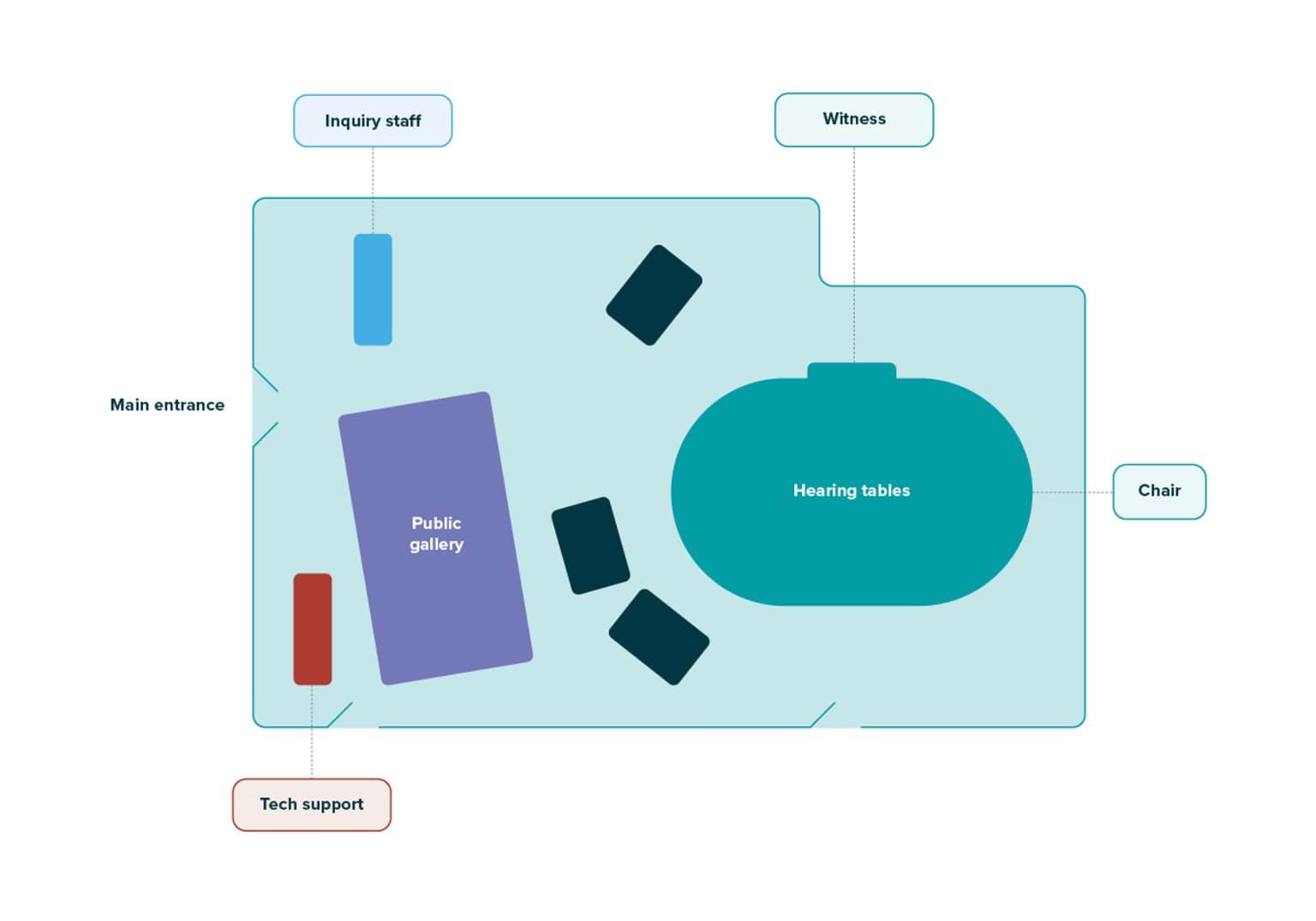The Board of Inquiry held seven days of public hearings, inviting a range of people to participate. Some gave oral evidence, some provided a witness statement, and some did both.
This appendix comprises:
- the public hearings timetable, which lists the dates, witnesses who appeared, and topics
- a list of individuals who provided witness statements or written narratives of their experiences
- the guide to public hearings provided to victim-survivors and secondary victims who appeared as witnesses giving oral evidence, or for whom a narrative was read out by Counsel Assisting.
The Board of Inquiry is grateful to those who gave oral evidence, provided witness statements or allowed their narratives to be read out by Counsel Assisting, and acknowledges their generosity in sharing their experiences. An explanation of the public hearings process and approach to witness statements can be found in Chapter 1, Establishment and approach(opens in a new window).
Public hearings
The following table lists hearing dates, witnesses and topics for the Board of Inquiry’s hearings.
| Date | Witness | Topic |
|---|---|---|
| 23 October 2023 | Tim Courtney, victim-survivor | Experience Focus on understanding the effects of historical child sexual abuse in government schools, and the individual and shared experiences of victim-survivors, secondary victims and affected community members |
| 24 October 2023 | ‘Bernard’ (a pseudonym),victim-survivor Dr Katie Wright, Associate Professor, Department of Social Inquiry, La Trobe University Professor Leah Bromfield, Director of the Australian Centre for Child Protection and Chair of Child Protection, University of South Australia (remote) | |
| 15 November 2023 | Dr David Howes PSM, Deputy Secretary, Schools and Regional Services, Department of Education | Accountability Focus on the accountability of the Department of Education in relation to the allegations of historical child sexual abuse in government schools |
| 16 November 2023 | Dr Howes (continued) Professor Patrick O’Leary, Co-Lead, Disrupting Violence Beacon and Director of Violence Research and Prevention, Griffith University Criminology Institute and School of Health Sciences and Social Work | |
| 17 November 2023 | Jenny Atta PSM, Secretary, Department of Education | |
| 23 November 2023 | Government panel:
Dr Rob Gordon OAM, Clinical Psychologist | Support services and healing Focus on support services and healing through the evidence of a range of witnesses from government agencies and community organisations, as well as relevant experts, and the experiences of victim-survivors |
| 24 November 2023 | Maureen Hatcher, Founder, LOUD fence Inc Adrian Farrer, Principal, Trinity Grammar School, Kew, Victoria Bruce Esplin AM, former Victorian Emergency Management Commissioner and former Chair of Regional Arts Victoria |
Witness statements and narratives
In addition to the witnesses who appeared during the public hearings, the Board of Inquiry also relied on witness statements from experts and written narratives from victim-survivors and secondary victims. People who provided a witness statement or for whom a narrative was read out during the public hearings are listed below.
| Witness statement | Narrative |
|---|---|
Professor Lisa Featherstone, Head of School, School of Historical and Philosophical Inquiry, University of Queensland Professor Daryl Higgins, Director, Institute of Child Protection Studies, Australian Catholic University Professor Michael Salter, Professor of Criminology, School of Social Sciences, University of New South Wales Dr Joe Tucci, CEO, Australian Childhood Foundation | ‘Casey’ (a pseudonym) ‘Dennis’ (a pseudonym) ‘Samuel’ (a pseudonym) ‘Paula’ (a pseudonym) ‘Hank’ (a pseudonym) ‘Christie’ (a pseudonym) Grant Holland |
A guide to public hearings for victim-survivor participants
This guide is to support victim-survivors, secondary victims and affected community members who are attending a public hearing.
Overview
What is a public hearing?
Public hearings are formal proceedings where witnesses give evidence under oath or affirmation about the events and issues that are relevant to the Board of Inquiry’s Terms of Reference.
The Board of Inquiry into historical child sexual abuse in Beaumaris Primary School and certain other government schools (the inquiry) is holding a series of public hearings in Melbourne. The focus of the public hearings will be in relation to the inquiry’s Terms of Reference, including:
- the experiences of victim-survivors of historical child sexual abuse who were abused by relevant employees at Beaumaris Primary school and other government schools
- the response of the Department of Education in relation to the historical child sexual abuse
- the appropriate ways to support healing for victim-survivors, secondary victims and affected community members
- whether there are effective support services for victim-survivors of historical child sexual abuse in government schools.
All public hearings will be streamed on the inquiry’s website.
Who will be there?
At a public hearing, the following people will be in the room:
- the Chair, Kathleen Foley SC
- Counsel Assisting, Fiona Ryan SC and/or Kate Stowell
- members of the inquiry’s Legal team
- witnesses and their legal representative(s)
- inquiry staff members, including members of the Support team
- the media
- members of the public.
Where can I find details about the public hearings?
Details about the public hearings, including daily schedules, will be available on the inquiry’s website: beaumarisinquiry.vic.gov.au(opens in a new window).
If you are unable to find these details or have further questions, please contact us via phone on (03) 8301 0102 or by email at contact@beaumarisinquiry.vic.gov.au.
Attending a public hearing
Location
The inquiry is holding its public hearings at Level 9, 54 Wellington Street, Collingwood. More information about the location appears later in this document.
What will happen when I arrive?
When you arrive at 54 Wellington St, walk down the brick pathway and enter the elevator lobby through the main entrance. Press the keypad to call the lift to take you to Level 9. On exiting the lift, turn left towards reception, where a Board of Inquiry staff member will be waiting to greet you.
Tea and coffee facilities will be available, and toilets are also available on Level 9.
Areas in the hearing room include:
- hearing tables — where the witness, the Chair of the Board of Inquiry, and legal personnel including Counsel Assisting will be seated
- the public gallery, with seating for up to 40 people
- separate desks or working areas for inquiry staff, legal personnel, media and technical support.
Giving evidence at a public hearing
Witnesses
People who give evidence at a hearing are called witnesses. The Chair and Counsel Assisting will determine who is to be called as a witness at a public hearing, the questions the witness will be asked and the order in which those witnesses are called and examined.
Witnesses may be identified by Counsel Assisting from public submissions, consultations, private sessions, other Board of Inquiry research activities and submissions made by people or organisations granted leave to appear.
If you have been called to appear as a witness, you will be contacted by the inquiry’s Legal team in advance of the public hearing. The Legal team will be your primary point of contact, and this team will guide you through your public hearing appearance.
Witness statements
The Board of Inquiry may require witnesses to complete a witness statement. These statements may be read aloud during the public hearing on behalf of the witness by Counsel Assisting. They may also form the basis of any questions Counsel Assisting puts to the witness.
The witness may be assisted to complete a statement by their legal representative or, if they are not legally represented, the witness may be assisted by Counsel Assisting to prepare their witness statement.
Quotes
During a public hearing, Counsel Assisting may read aloud quotes from victim-survivors, secondary victims or affected community members provided during private sessions or as part of a submission to the Board of Inquiry. The identity of the author of these quotes may be restricted at the request of the author.
Can I bring a support person?
Yes, you can bring a support person to the public hearings.
Your support person could be a family member or friend, as well as your own counsellor or lawyer. They can come into the public hearing room or wait for you in a room close by.
Counselling and support for victim-survivors and secondary victims
The inquiry has a team of counsellors who can provide support to victim-survivors and their family or other support people ahead of, during and after a public hearing.
Pre-hearing support
Prior to a public hearing, our support team will be connecting with victim-survivors or secondary victims who are already engaged with the Board of Inquiry.
The support team will be available to assist victim-survivors or secondary victims who have previously not had counselling.
For victim-survivors and secondary victims who have previously declined the offer of support, the support team will be available to assist if they wish to re-engage.
On-the-day support
The support team will also attend all public hearings to provide counselling and support to witnesses and attendees on the day.
There will be several private rooms available for discreet conversations with members of the support team. If you require support on the day, please speak to a member of the Board of Inquiry team.
Please contact us if you require any further support on (03) 8301 0102
or email contact@beaumarisinquiry.vic.gov.au.
What happens after I have given evidence?
Once you have given your evidence, you are welcome to re-join your family or supporters in the public gallery. If you wish to speak with a member of our support team, they will be available to conduct a debrief session in one of the nearby rooms.
A few days after your appearance at a public hearing, a member of the support team will conduct a post-appearance check-in to see if you would like any additional supports.
If you do not wish to stay for the remainder of the public hearing, you are free to leave.
Updated


